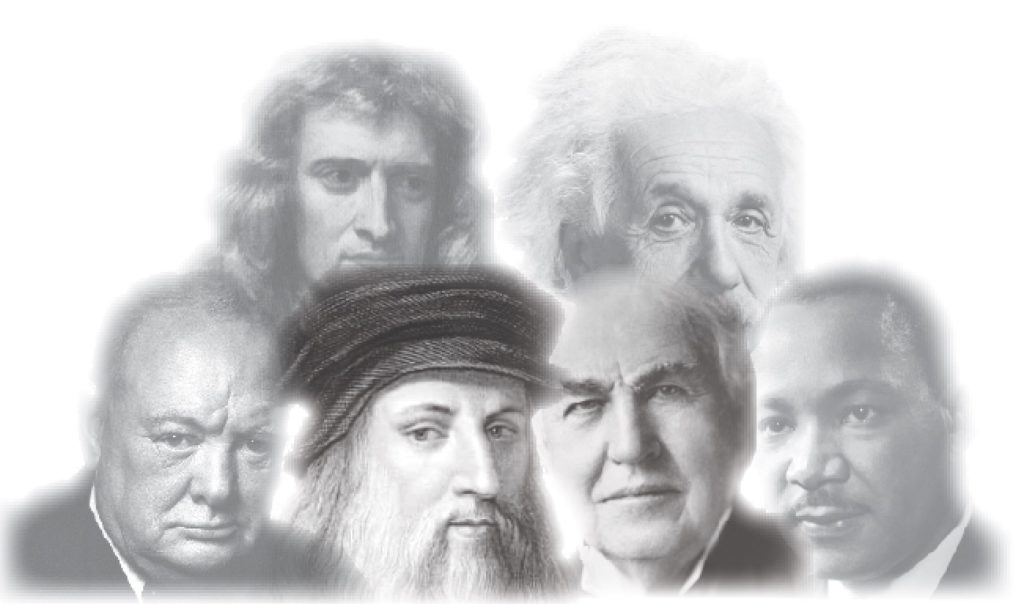
Most people would agree that Albert Einstein, Nikola Tesla, Winston Churchill, Martin Luther King Jr. and Benjamin Franklin were highly intelligent people. All had a high degree of self-efficacy, believing in their vision even when it ran contrary to consensus.
Albert Einstein’s assertions that time is not absolute and gravity is related to the geometry of space around masses were ridiculed by some and dismissed by many. Tesla’s insistence that alternating current was superior to direct current as a basis for the electrical grid was attacked by Edison and others. Churchill’s warnings about the threat posed by Stalin were ignored and he was voted out of power by a war-weary British electorate in 1945.
Each of these highly intelligent people was able to stand alone against consensus and pursue their own vision, while recognizing their personal fallibility. When young scientists presented experimental evidence that Einstein’s Theory of Relativity was correct, the old man as he viewed the presentation would shake his head and utter, “Ist das wirklich so?” (Is that really true?) He held his theories in abeyance until they were verified by experiment. Similarly, Ben Franklin once stated in Poor Richard’s Almanack,“ None but the well-bred man knows how to confess a fault or acknowledge himself in an error.”
Such self-efficacy comes from an awareness of one’s intellectual gifts and a willingness to trust oneself against widespread opposition. However, those who are highly intelligent are usually intelligent enough to recognize that they may be wrong. Kipling captured this in his famous poem, IF, “If you can trust yourself when all men doubt you, but make allowance for their doubting too.” This recognition of personal fallibility is manifest in the highly intelligent in an openness to dissenting opinion and a willingness to listen to opposing arguments. Absolute certainty and dogmatic adherence to a specific point of view or belief is the province of people of much lower intelligence, not the intellectually gifted. Steve Jobs, when asked how he identified intelligent people, described them as open to a wide panorama of different ideas.
However, there is a downside to high intelligence. Those who are intellectually gifted recognize that we are primates, slightly more cognitively aware than our fellow primates, but lacking the capacity to understand the deep underpinnings of our existence. Though the intellectually gifted recognize they have greater intellectual capability than most other humans, they recognize that what we know as a species is only a tiny fraction of what there is to know. Human behavior is mostly determined by the emotional scripts embedded by evolution in our DNA and, as history has shown, we’re in a self-destructive mode as a species. This awareness often leads the highly intelligent to a sardonic skepticism about life and its lack of meaning.
When asked whether he believed in an afterlife, Einstein who was saddened and lonely is his final years, responded, “I’ve had one life; I don’t need another.” When voted out of office after World War II, Churchill fell into a deep depression that he called his “black dog.” Late in life, Tesla commented, “To me, the universe is simply a great machine which never came into being and never will end” and “what we call ‘soul’ or ‘spirit,’ is nothing more than the sum of the functionings of the body. When this functioning ceases, the ‘soul’ or the ‘spirit’ ceases likewise.”
As my old Latin teacher once told us, quoting a Roman author, “To think is to be sad.” It’s the downside of having a high intelligence. The highly intelligent are often introverts who feel alienated from the rest of humanity by their different view of the world. Their friends are usually a few colleagues in their field of study or other highly intelligent people with whom they can share ideas. The adage, “It’s lonely at the top” is usually applied to leadership, but it applies equally well to intelligence. Of course, these statements are generalizations. There are many highly intelligent people who are able to accept life on its own terms and learn to derive some joy in life from loving relationships and interesting projects. Yet, the dark side of quiet reflection is always lurking in the background.
Many people, observing the advantages of the highly intelligent who learn quickly and easily, who accumulate many degrees or build great wealth, are prone to envy the gift of high IQ. Yet, if they understood the dark realizations and awareness that accompany high intelligence, they would be wise to invoke the Chinese adage, “Be careful what you wish for.”
